PS cutout filter knockout 2.0 download (with usage tutorial)
Software level: ★★★★★
Software size: 21m
Authorization method: Unknown authorization
Software category: Other categories
Running environment: Win9x/NT/2000/XP/
Software update: 04.26
Software introduction: Photo studio production software is a must-have for photo album production. Usually we modify a picture, change the background of a character, and also use picture deduction. These tasks can be achieved with PS, but to achieve good results, it is difficult for novices to do it, and even for PS masters, it takes a lot of effort. A lot of effort. The software introduced below makes everything simple. This is one of the PS static cutout software. After installation, it can be used as a PS filter. It is very convenient, especially for girls with flying hair. It can achieve a satisfactory effect for you, with clear hair roots visible. The following is an introduction from installation to simple use.
Usage tutorial
1. Install knockout 2.0 in Photoshop
After downloading knockout
2.0, you must install the "plug-in" filter in photoshop "Under the path, this step is critical.
1.Installation path in photoshop 7.0: C:""ProgramFiles""Adobe""Photoshop 7.0""Filter""Plug-In
2.photoshop Installation path in CS
8.01: C:""ProgramFiles""Adobe""Photoshop CS
8.01""Plug-ins""Filter
When you start photoshop after installation, in the filter menu There is knockout 2.0 in it.
2. Steps to cut out pictures using knockout
2.0
Open the picture: Run PhotoShop
, we open a picture. 
Copy the new layer: Select the "Background" layer, right-click the mouse and select "Copy Layer". Because KnockOut
2.0 cannot be run with the original layer, we need to create a new "Background Copy" layer. 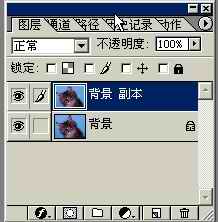
Start KnockOut 2.0: Select "KnockOut2" → "Load Working
Layer" under "Filter" to start running KnockOut 2.0 (Figure 3). After entering KnockOut 2.0, select Zoom Tool (icon 1) in Toolbox
to adjust the view size of the image so that the image is completely displayed on the screen so that we can view the image Perform the operation (click "CTRL + left mouse button" to enlarge the image, click "ATL + left mouse button" to reduce the image). 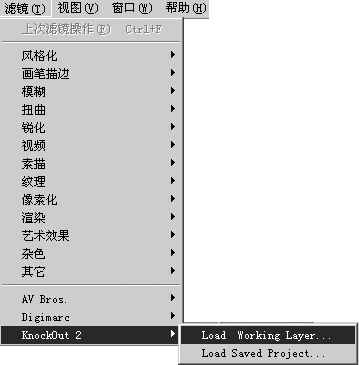
Draw the reserved area of the picture: Click Inside
object in the toolbox in the KnockOut 2.0 interface, and start drawing lines along the inner edge of the picture (Figure 4) , the part within the drawn line is the part that needs to be retained. When drawing lines, be careful not to touch the outside of the image, otherwise the cutout will be damaged. In short, remember that the background color inside the lines is opaque. If you can't see the actual edge of the image clearly when drawing the line, you can press the L key to zoom in. If you are not satisfied with the drawn area, you can press the "Ctrl+D" keys to cancel the drawn area and redraw the area. 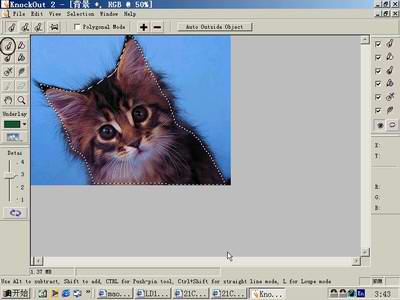
Then click the Outside
object in the toolbox and draw a line along the outer edge of the picture (Figure 5). After this drawing is completed, the parts other than the drawn lines need to be deleted. The area between the inside of the drawn line and the last drawn line is the transition area of the image from opaque to transparent, which is the area where we are going to cut out the image. 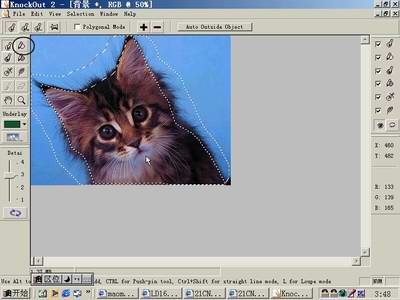
Set the image background color: Click the small triangle under the Underlay key on the left and a color box will pop up. We can choose one according to our needs. If we are not satisfied with these colors, You can click the Other button to adjust it yourself.
Set the cutout accuracy: Set the Detai value to 4 (as shown in Figure 6). This value is based on the complexity of the edge of the picture: the simpler picture is set to 1, as the complexity The degree can gradually increase). 
Cutout: Click the cutout button , the program will automatically cut out the image, and finally get the result shown in (Figure 7). If you want to cancel the cutout, you can click Revert in the File menu to restore it.
, the program will automatically cut out the image, and finally get the result shown in (Figure 7). If you want to cancel the cutout, you can click Revert in the File menu to restore it. 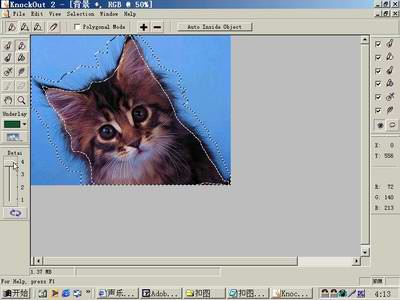
Embed background image: Do you want to add a beautiful background image to the cut out image? Clicking on the small frame above Detai will bring up a menu, and then select according to the path.
Exit: Click Apply in the File menu to return to the PhotoShop interface. If you still want to add any dazzling effects, just continue in PhotoShop. 
More PS cutout filter knockout 2.0 download (with usage tutorial) For related articles, please pay attention to the PHP Chinese website!

Hot AI Tools

Undresser.AI Undress
AI-powered app for creating realistic nude photos

AI Clothes Remover
Online AI tool for removing clothes from photos.

Undress AI Tool
Undress images for free

Clothoff.io
AI clothes remover

Video Face Swap
Swap faces in any video effortlessly with our completely free AI face swap tool!

Hot Article

Hot Tools

Notepad++7.3.1
Easy-to-use and free code editor

SublimeText3 Chinese version
Chinese version, very easy to use

Zend Studio 13.0.1
Powerful PHP integrated development environment

Dreamweaver CS6
Visual web development tools

SublimeText3 Mac version
God-level code editing software (SublimeText3)

Hot Topics
 1672
1672
 14
14
 1428
1428
 52
52
 1333
1333
 25
25
 1277
1277
 29
29
 1257
1257
 24
24
 Advanced Photoshop Tutorial: Master Retouching & Compositing
Apr 17, 2025 am 12:10 AM
Advanced Photoshop Tutorial: Master Retouching & Compositing
Apr 17, 2025 am 12:10 AM
Photoshop's advanced photo editing and synthesis technologies include: 1. Use layers, masks and adjustment layers for basic operations; 2. Use image pixel values to achieve photo editing effects; 3. Use multiple layers and masks for complex synthesis; 4. Use "liquefaction" tools to adjust facial features; 5. Use "frequency separation" technology to perform delicate photo editing, these technologies can improve image processing level and achieve professional-level effects.
 Photoshop's Key Features: A Deep Dive
Apr 19, 2025 am 12:08 AM
Photoshop's Key Features: A Deep Dive
Apr 19, 2025 am 12:08 AM
Key features of Photoshop include layers and masks, adjustment tools, filters and effects. 1. Layers and masks allow independent editing of image parts. 2. Adjust tools such as brightness/contrast can modify image tone and brightness. 3. Filters and effects can quickly add visual effects. Mastering these features can help creative professionals achieve their creative vision.
 Using Photoshop: Creative Possibilities and Practical Uses
Apr 22, 2025 am 12:09 AM
Using Photoshop: Creative Possibilities and Practical Uses
Apr 22, 2025 am 12:09 AM
Photoshop is very practical and creative in practical applications. 1) It provides basic editing, repairing and synthesis functions, suitable for beginners and professionals. 2) Advanced features such as content recognition fill and layer style can improve image effects. 3) Mastering shortcut keys and optimizing layer structure can improve work efficiency.
 Photoshop and Digital Art: Painting, Illustration, and Compositing
Apr 18, 2025 am 12:01 AM
Photoshop and Digital Art: Painting, Illustration, and Compositing
Apr 18, 2025 am 12:01 AM
Photoshop's applications in digital art include painting, illustration and image synthesis. 1) Painting: Using brushes, pencils and mixing tools, the artist can create realistic effects. 2) Illustration: With vector and shape tools, artists can accurately draw complex graphics and add effects. 3) Synthesis: Using mask and layer blending mode, artists can seamlessly blend different image elements.
 Using Photoshop for Graphic Design: Branding and More
Apr 16, 2025 am 12:02 AM
Using Photoshop for Graphic Design: Branding and More
Apr 16, 2025 am 12:02 AM
The steps to using Photoshop for brand design include: 1. Use the Pen tool to draw basic shapes, 2. Add shadows and highlights through layer styles, 3. Adjust colors and details, 4. Use smart objects and actions to automatically generate different versions of the design. Photoshop helps designers create and optimize brand elements with the flexibility of layers and masks, ensuring consistency and professionalism of designs, from simple logos to complex branding guides.
 Photoshop for Photographers: Enhancing and Retouching Images
Apr 25, 2025 am 12:01 AM
Photoshop for Photographers: Enhancing and Retouching Images
Apr 25, 2025 am 12:01 AM
Enhance and retouching photos in Photoshop can be achieved by adjusting brightness and contrast, using the Repair Brush Tool. 1) Adjust brightness and contrast: Increase brightness and contrast to improve underexposed photos through the Image->Adjustments->Brightness/Contrast menu. 2) Use the Repair Brush Tool: Select HealingBrushTool in the toolbar and apply to remove miscellaneous points or scars in the image.
 What Photoshop Does Best: Common Tasks and Projects
Apr 23, 2025 am 12:06 AM
What Photoshop Does Best: Common Tasks and Projects
Apr 23, 2025 am 12:06 AM
Photoshop is specialized in image editing, layering and masking, digital painting and a variety of design applications. 1) Image editing and repair: remove defects and adjust color and brightness. 2) Layers and masks: non-destructive editing and creation. 3) Digital paintings and illustrations: create art works. 4) Practical applications: graphic design, web design and digital art creation.
 Photoshop's Subscription Model: What You Get for Your Money
Apr 15, 2025 am 12:17 AM
Photoshop's Subscription Model: What You Get for Your Money
Apr 15, 2025 am 12:17 AM
Photoshop's subscription model is worth buying. 1) Users can access the latest version and use across devices at any time. 2) The subscription fee is low, and continuous updates and technical support are provided. 3) Advanced functions such as neural filters can be used for complex image processing. Despite the high long-term costs, its convenience and feature updates are valuable to professional users.




